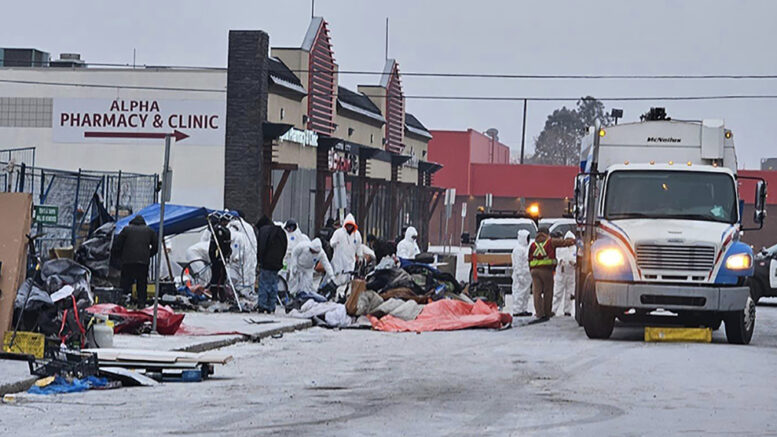By Jeremy Appel, Local Journalism Initiative Reporter
(ANNews) – Dozens of speakers signed up to comment on the City of Edmonton’s proposed Public Spaces Bylaw at a Feb. 10 Community and Public Services Committee meeting, a majority of whom objected to it, including several Indigenous speakers.
The proposed bylaw, which has been in the works since 2022, merges the Conduct of Transit Passengers, Parkland and Public Places bylaws, as well as aspects of several other bylaws which deal with the use of city spaces.
As presented, the bylaw would ban spitting, public drug use and panhandling near roads, sleeping outdoors and feeding wildlife. It would also require organizers of events with more than 100 expected attendees to obtain permission from the city and liability insurance coverage for $2 million.
Judith Gale of Bear Claw Beaver Hills House, an Indigenous-led outreach group for people who are unhoused, told the committee that it’s “really egregious that you’re picking on our brothers and sisters.”
She noted how Edmonton has nearly 5,000 unhoused people, who are “disenfranchised from every aspect of society, even their families.”
“We have got to take care of our most vulnerable and stop treating them like untouchables,” said Gale.
According to the city’s 2023 Housing Needs Assessment, Indigenous people represent five per cent of Edmonton’s population, but compose 55 to 65 per cent of its unhoused population.
Earth, another speaker from Bear Claw, said that she’s observed a notable increase in unhoused people “losing their lives while living outside,” deaths which often go unreported.
“Their lives are so undervalued by those in positions of authority that they often remain nameless,” said Earth.
Citing the early 2024 sweep of encampments and the city’s decision to pay $225,000 to fence off the former encampment sites, Earth said that “those in positions of power have wielded their authority to make the lives of unhoused individuals increasingly unsafe, resulting in dire consequences.”
The proposed bylaw, which imposes a $25 fine for panhandling, would only make matters worse, Earth added.
Rachelle Gladue, co-founder of the Tawâw Outreach Collective, told the committee that having worked in security on the one hand, and supportive housing, shelters and harm reduction on the other, she can “see both sides clearly.”
Gladue, a 2-Spirit mother and Indigenous social work student at Yellowhead Tribal College, said she doesn’t “feel safe” raising a child in Edmonton, and has considered moving to a different province.
“Consider how the lack of safety here makes me feel the need to leave my own homeland, the land that you guys acknowledged,” she said, referring to the land acknowledgement at the beginning of every city council meeting.
“I should not feel so inclined to leave my own land, but the city’s policies are making it impossible for poverty and crime to be eliminated, making public safety harder to achieve.”
The fatal flaw in the proposed bylaw, Gladue said, is that it assumes “everyone has the same abilities and opportunities,” failing “to account for diverse and complex needs.”
“The message is clear—public survival is not permissible,” she said.
Edmonton Chamber of Commerce VP of economy and public engagement Heather Thomson expressed the chamber’s “strong support” of the bylaw, which she argued is “designed to balance the safety [of] both housed and unhoused individuals.”
“We cannot maintain the status quo with regards to public spaces. It’s just not working right now,” said Thomson.
But not all business groups support the bylaw. Alberta Avenue Business Association executive chair David Plamondon, who owns the Indigenous-themed tabletop board game store Pe Metawe Games disagrees.
“This particular bylaw, as it stands, has a disproportionate effect on folks who are already vulnerable, who the system has already failed, and who are already experiencing houselessness and poverty,” Plamondon told the committee.
“There’s no reason why somebody should be doubly punished for having to do what they can to survive.”
Jakob Cardinal, a MacEwan University business student from Saddle Lake Cree Nation (not to be confused with former Alberta Native News reporter Jacob Cardinal, also from Saddle Lake), said the overrepresentation of Indigenous Edmontonians in the city’s homeless population is a manifestation of an “unrelenting trail of broken trust.”
“First Nations people did not have any homeless [people] until your governments were put into place,” said Cardinal.
But, he emphasized, the proposed bylaw impacts all Edmontonians.
“Respecting the diverse needs of equity-deserving populations is integral, but while remaining under the ever-strengthening grip of capitalism, we all one day may need some type of equity initiatives,” said Cardinal.
He noted how people “freeze to death outside of” the city’s $600-million publicly funded hockey arena, and that snow clearing and emergency medical workers refer to the people they find frozen to death on the streets as “popsicles.”
“How many more popsicles will this council allow?” said Cardinal. “According to you, the number one concern is drug use in public places, not the rise in the number of people freezing to death.”
The committee voted to recommend council pass an amended version of the bylaw, which affirms Edmontonians’ Charter rights and exempts feral cats from its provision banning feeding animals.



Be the first to comment on "Indigenous Edmontonians criticize proposed Public Spaces Bylaw at council committee meeting"